![]()
![]()
![]()
![]()
![]()
![]()

Overview of Bob Marley
![]()
It’s been 52 years since his birth and more than 15 since his death, yet Bob Marley’s name, music and spirit live on. He’s still the best-selling reggae artist in the world, still a mystic and musician with a lasting impact on people, politics and world culture.
Marley was born on February 6, 1945 in the tiny Jamaican village of Nine Mile. Not rich in material goods, life with his mother and grandfather was vital in love and music. When Marley was five-and-a-half he was taken away by his rich and absent father and put into the hands of a caretaker who basically left him to live on the streets of Kingston, Jamaica’s capital. It was then that Marley first encountered the "Babylon" of his songs – where what’s right is wrong and wrong is right.
Rescued and returned to his mother, Marley threw himself into music and soon met up with Bunny Livingstone (aka Bunny Wailer) and, later, Peter McIntosh (aka Peter Tosh). The three became good friends and in 1963 the trio and two other friends formed the Wailing Wailers. An audition before a top record company promoter led to a single, "Simmer Down," which charted immediately in Jamaica and established the trio as an important new group on the Caribbean scene.
Over time the Wailing Wailers despite losing a few members, recorded a few albums and for two years were musical kings in Kingston. But the pressures of the music business took their toll: Marley felt a need to take a break from the action and he left for the States. After nine months of uninspiring factory work, he returned to Jamaica, re-formed the original group and hit the road as The Wailers.
The Wailers again achieved success in the Caribbean but had a difficult time breaking into the American and European markets. Eventually Island Records offered the band a contract. They recorded "Catch a Fire" and began touring relentlessly throughout Europe.
The band's sophomore effort, "Burnin", with its single, "I Shot the Sheriff", was released in 1973. Although it broke few sales records, fans and critics alike praised the group for its new beats and rhythms – until this time very little reggae had reached the ears of the mainland and pop music was ripe for this new sound. But as "Burnin" was released, the Wailers broke up.
In 1974, Marley continued playing under the Wailers name and released "Natty Dread," backed up by the I Threes, three female harmonists, including Rita Marley, his wife. Bob Marley performed as prophet, shaman and warrior, warning of Babylon. Yet he also delivered messages of peace, love and unity. His belief in Rastafari was being spread throughout the world. Its teachings – a combination of Christian doctrine and African unity – praised Jah through meditation, music, love and marijuana.
Marley reluctantly headlined a concert organized by politicians in Jamaica that was allegedly to promote national unity. Two days before the concert, gunmen broke into Marley's house and shot the singer, his wife and several close friends. Convinced not to performing was to giving into those who had tried to silence him, Marley went on to perform for a crowd of 80 000, and then exiled himself to London for 18 months.
In London Marley recorded "Exodus". The album charted number one in England and Germany its first week of release, and all was well with the band. Then Marley was diagnosed with cancer. Although doctors advised that he cancel his tour, Marley continued through the last of the scheduled dates.
Afterward, Marley returned to a hero’s welcome in Jamaica to play the One Love Peace Concert, a benefit to help unify the political and spiritual factions of his homeland. During the show Marley insisted that the leaders of the two opposing political parties shake hands on stage, a monumental event in Jamaican history. Soon after that show the United Nations bestowed the 1978 Third World Peace Medal upon Marley for his constant efforts on behalf of equal rights and justice.
Later that year Marley visited Africa. The condition of the people there inspired many new songs about freedom, justice, equality and the gospel of Rastafari. The albums "Babylon By Bus", "Survival", "Kaya" and "Uprising" continued to spread his message of political and spiritual revolution while earning him an even bigger international following.
In late 1980, Marley was hospitalized with advanced brain and lung cancer. He died in Miami on May 11, 1981, at the age of 36. His funeral services in Jamaica drew nearly one million mourners – nearly half the country’s population.
In the spring of 1983 the Confrontation album was released. It contained unreleased songs, edited songs and songs that had only been released in Jamaica. The song Buffalo Soldier became a posthumous hit. In 1984 Legend was released. Thanks to the hit One Love/People Get Ready this beautiful album became a worldwide bestseller. Bob Marley lives on.
Ten years after Bob Marley's death a special concert took place in Kingston to commemorate Bob Marley. Several artist, among which Ziggy Marley & The Melody Makers and the Reggae Philharmonic Orchestra performed and raised money to establish a Bob Marley Entertainment Complex in Kingston.
![]()
Photos of Bob Marley
Click on above image to go to Bob,s Interview
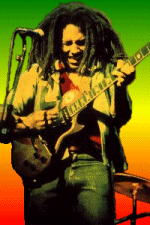
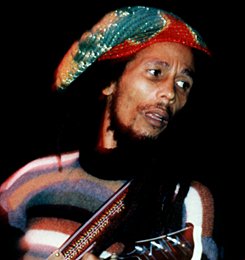
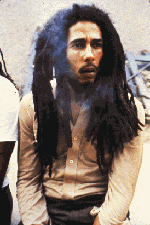
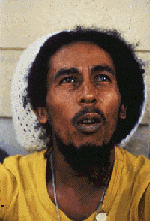
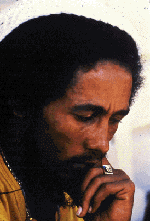
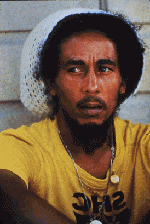
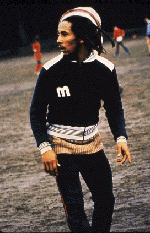
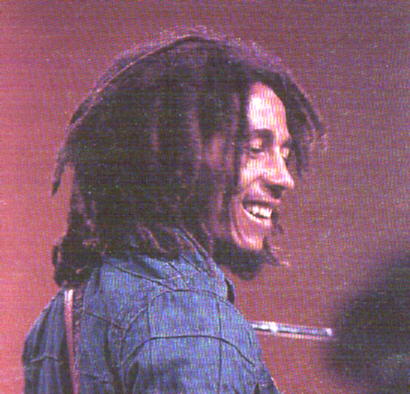
For more photos click photo below for Bob'sWar song and page gallery
![]()
This page created using Weedscape Gold 3.0
![]() Send
comments or queries to jcumberbat@hotmail.com
Send
comments or queries to jcumberbat@hotmail.com